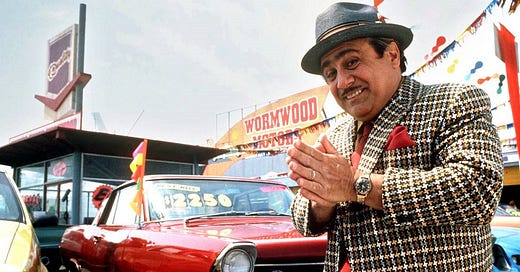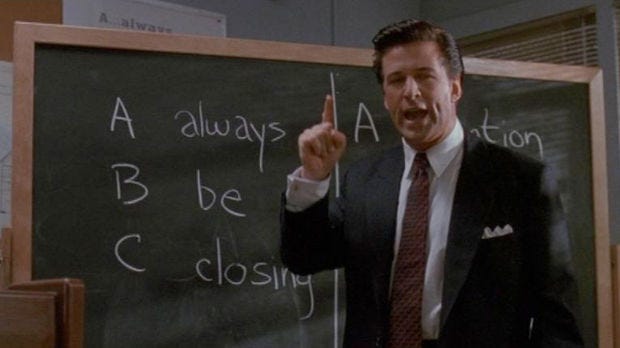A Teenager's Guide to Workplace Ethics
In 1982, the author faces some tricky dilemmas in his first job at a car dealership.
If I get accused of writing this post just for the sake of fan service, I guess I’ll have to own it, because I really had no plans to do a follow-up to my previous story about my 1982 teen summer job, until people started asking for more about it.
The original tale was about how I hacked my way into a pretty nice summer gig, but I did not go into much detail about other things that happened after I took the job, apart from teasing a few details. I couldn’t really see a way to make a follow-up into anything other than a random collection of anecdotes about some dude’s experiences when he was working at a car dealership though. So I was not thinking about writing any of it up.
But then I came upon a central theme - having to do with navigating the minefield of ethical decisions one encounters when they first start working. I thought I’d string these together here into a set of interesting situations I ran into, along with a self-assessed grade at how I fared with them. Maybe you will think I was too hard on myself for some of my decisions, or maybe, not hard enough.
New IT Guy Orientation
If you want the full context of what was going on with this job I recommend reading the link above, but for those not inclined — the summary is, I was a high school kid who got a job working at a somewhat shady car dealership, by successfully hacking their computer. My employer was a guy we’re calling “Jim”, who along with his wife “Elaine”, owned the business and ran the office.
My work area here was at a terminal in a small, windowless office, along with two other office staff, and Elaine, who was the office manager and had a separate room to herself. At least one of my coworkers was a heavy smoker, and since this is 1982 we are talking about, the smoking was done at your desk. So I’ve already received my second-hand smoke allotment for life probably, based on this job.
Also, since this office was directly attached to a car repair area, there was a lot of dust from god-knows-what around. Not the healthiest of work environments for sure. Teenage me really didn’t care too much, but the Nova minicomputer in the room kind of did.
Sometime in my first week of work there, the system started acting flaky, and then crashed. Reboot didn’t help much, and I was sure Jim was screwed with some hardware problem because he had no service contract for this machine. Also no real backup policy, and although it’s not an ethical issue, I do give myself a “D” for not being professional here and making more backups. Especially when I did risky things like add fields to their relational DB, an operation that could have led to an unrecoverable state of their financial records (or, some of them at least… read on.)
Anyway when the Nova crashed, I told Elaine, expecting her to flip out. Instead she told my office mate Sue that it was time for a “blow-out”. Sue in turn got on the PA system connected to speakers that blared in every location of the building complex, and announced: “RANDY TO THE OFFICE FOR A BLOW-OUT.” This was, apparently, an established procedure.
Pretty soon this guy in a blue uniform with a white nametag and red lettering saying “Randy” showed up, dragging a long hose behind him, which was attached to the main air compressor in the repair shop bay. He expertly removed the front panel from the Nova, like it was a hubcap on a flat tire. Then he stuck the compressor hose in, and blasted away - causing a huge plume of dust to come billowing out of the Nova. Then he closed it up, rebooted it, and the machine was fine after that. (not sure about the office staff, given where all the dust went)
I quickly learned that rinky-dink stuff like this was commonplace. Jim and company followed the path-of-least-resistance whenever and wherever possible, and would cut corners and skip rules if they felt the need. On that latter point, the next thing I would learn was that not all records were kept in the computer database I was working on. Elaine had a second set of books, in the physical form of a ledger that was kept in a safe in her office. Some transactions on the computer system went in both, and some, only in the ledger. I think my (under-the-table) pay for instance, was a ledger transaction. And who knows what else. I made it a point never to try to look at that book, although the other office staff would routinely go into Elaine’s office to annotate it.
So my self-grade here for being part of this obviously tax-evading scheme is “C”. I’ll accept judgement from others with a harsher grade, since I was willingly and knowingly taking part in an obviously-illegal activity. But I’m going a little easy on myself because my options here were limited: snitching to the IRS about the whole thing, confronting Jim and Elaine on it, or quitting my job. And none of these were really attractive or realistic options for me at the time.
For advice purposes, I would say that getting paid under the table is one thing, but working for and aiding someone who is actively avoiding paying their business taxes is another. If this whole scheme was ever caught, the penalty for being paid under the table would probably just be to pay the back taxes and interest. The penalty for helping build a software system to hide income would be jail. And Jim eventually did get caught, just not for this particular scheme. As a teen I never considered any of this risk, but looking back I can see how it could have potentially exposed me to legal jeopardy.
The Secret Formula
The next thing that became obvious to me working for Jim was that shorting people he owed was not limited to the government. Jim would come up with many ideas for computer programs to help his business. One cool one was, he had me modify the repair order entry system to start tracking what radio station the customer’s car was tuned to . Mechanics would check the setting when they were in the car, and record the station ID, the summary of which Jim got as a nice bar chart. He could then figure out where to spend his advertising dollars based on the data. Pretty smart.
In another project, Jim wanted a program to calculate the commission bonuses for his sales staff based on how much they made selling cars. This was being done manually by Jim, and here I learned that there was no straightforward formula for computing these amounts, which included a number of conditions and hoops the sales staff had to jump through in order to make the maximum commission. When it was time to write this program, Jim had to take me aside outside of even the office staff to tell me his formula, it was so secret.
I could tell that the effect of this secret formula was to reduce payments to sales people, while maintaining the appearance of there being a straightforward percentage commission system. No one ever got a any breakdowns of how their commissions for the month were computed, just a check for the month. So it really could not be challenged.
I wrote the program anyway though, so I guess it would be another “C” for knowingly going along with it, but for one thing: As I was testing this program, I needed to verify I was calculating the numbers right, so I pulled some old records of car sales and the paid commission amount to check it. A couple small ones checked out OK, but then a big sale of multiple cars to a customer came out wrong. I checked over the program several times and couldn’t explain it, my number was higher than what was on the paper version.
I took this to Jim, and he acknowledged that even by his own formula, he had shorted this sales woman out of close to a hundred bucks. I knew Jim well enough by then to know this was no mistake — and I actually did, kind of, confront him on it.
“So you are going to update her commission, right?” I asked.
“Sure, I’ll go through all of these now that you have the program” Jim said vaguely, but we both knew it was a lie. He put the sales slip back in the drawer, and I remember being a mad, since even if he had calculated these correctly, his formula was still unfair to the sales staff.
I did go to the sales woman later that day, and I told her we found a discrepancy in her check and she should ask Jim about getting an updated payment. This carried some theoretical risk to me, since Jim probably wanted to continue to keep anything about the commission system secret. But since he promised me he would ‘get to it’, he really couldn’t take me to task about letting the lady know she was due money. It might be the first time though I put myself in the line of consequences, however slight, to help someone who was being wronged.
You remember stuff like that, as well as the times in life you failed to act to help someone out. A lot more than you remember times you tried to help, but should not have. Anyway I’ll upgrade my grade to “B+” on this one, since I mostly did what I could.
Welcome to the Family
Most of my time working for Jim was drama-free however. It was a lot of fixing bugs, and making feature improvements to the system. Jim and Elaine were pretty happy with my work; I was showing up reliably, doing what they asked without a lot of problems cropping up. Jim was very excited about creating new software and had some ambitious dreams about selling versions of it to other car dealerships. That was an opportunity offered to me later.
But Elaine had another opportunity immediately in mind for me: their daughter, “Robin”. I don’t know how many of you have had the experience of having a romantic prospect practically clobber you over the head to get your attention, but you fail to notice until much, much later. But it seemed to happen to me with regular frequency when I was a nerdy, shy teen.
Robin showed up one day in the office to ‘help out’, and Elaine introduced me to her. Robin was 17, very attractive, and outgoing, which came across as oddly friendly from my perspective. (Which was the perspective of someone whom girls did not usually give the time of day to, so even saying “hi” qualified as flirting for me.) Not clear on the details now but I suspect I was maneuvered into taking her to lunch. I don’t really remember how that happened, maybe she asked me or something because I probably would not have been bold enough to ask her.
We went to the Burger King drive-thru (I’m nothing if not a classy date). I at least paid for it, and we went to the park. I had not the foggiest idea of how to talk to girls, so I mostly listened, at let her lead (probably the best advice I will give all article). She started telling me about her boyfriend troubles, which featured a dirt-bike riding classmate of hers she had been going out with for a while, but who was prone to violent behavior that she really didn’t like. I listened sympathetically, and told her maybe things would improve.
Several things were going through my head here. First, the fact she had brought up her boyfriend said to dating-naïve me that she was unavailable. I did have enough sense to realize that the mere fact we were at lunch together meant I had a chance with her, but not enough sense to realize that chance was close to 100%, had I put in any effort.
The second thing that occurred to me was, dating the bosses underage daughter who has a violent boyfriend was a spectacularly bad, if not physically perilous, idea. Would still not have stopped some people I knew. If there were a grade for common sense behavior here, I would give myself an “A” for this one, even though it makes for a less-interesting story.
The third thing did not occur to me until an embarrassingly long time, years even. This is the fact that Robin showing up in the office while I was there was no accident. I would never have categorized myself as an attractive prospect for anyone when I was 18. But as a parent, I could see that Robin’s mom Elaine would tend to look at this nice, shy kid going to engineering school, and think it would be a good trade up for her daughter, and maybe even get her away from a potentially dangerous situation. Don’t know what finally happened there, but hopefully Robin did find the right person eventually.
Anyway no ethics grade here. I would offer advice along the lines of don’t mix romance and work, if I had not later married someone who worked in the same (much, much bigger) office as I. The heart wants what the heart wants, regardless of advice.
Who’s Sitting in My Chair?
The summer came to an end, and I went back to school. I didn’t really keep in touch with Jim over the winter, I had assumed this job was a one-shot deal and Jim would get someone to replace me once I left.
The next summer I returned to visit Jim though, to say “hi” since we had not been in touch, and just check on the outside chance he might have any work. Much had changed in the time I had been gone. Jim had been working on a dream of his before I left, which was to own an actual new car dealership.
It was not clear if the deal was going to go through when I left for school, but when I showed up on site in the spring of 1983, there was a bright blue “Ford” logo sitting on top of the building. And when I went into the back office to say hello, there was a jolly, red-bearded guy named Dan sitting in my chair.
Elaine, was also there, and she was glad to see me, she said. She explained that Dan had been hired after I left to continue work on the system. He was a year or two older than me, and was a computer science graduate student at the local University. So I was about to make my departure, since it seemed the job had been filled.
But instead, Elaine took me into her office and said that she and Jim had talked, and they had decided that they wanted two programmers working on the system this summer. They offered me my 20-hour, $400-a-week salary from last summer, which I accepted. Elaine also mentioned that they were paying Dan less, more like $300 a week, and so I shouldn’t mention what I was making to him.
Dan as it turned out was married, with a small child. The money he was making at this job was pretty much paying for family expenses. We were at very different points in our lives, but we turned out to be friends, and also fairly equally matched in terms of our programming skill. It was really my first experience collaborating with someone on code, and a positive one.
It is somewhat the “norm” in the tech industry to not share salary information, and to be in situations where people with the same job title have different pay levels, but this was my first experience with that inequality, and it felt bad. Especially since Dan could have used the extra money, given his family situation, and was doing the exact same job as me. Yet I did nothing about it at the time, and did as Elaine instructed and did not discuss our income difference. I could have lobbied to raise Dan’s pay to match mine, or at least, split the difference with him. I give myself a ”D” on this one for failing to act - even though I’m sure many will say, that’s kind of how things are in the business world in general.
That Time I Almost Got Fired
Dan and I worked mostly non-overlapping schedules, but a day or two a week were in the office together. We’d split up projects and each do different forms and reports Jim and Elaine wanted done. A kind of nerdy, joking rivalry formed between us, especially when doing boring things like sales report forms. I decided, out of pure nerd vanity, to add my initials, “N.U.” to the border of the printed title page header, using sneaky lower-case characters so it looked like a design: “nununununu”.
When I showed it to Dan and bragged how I had left my lasting mark on the business, I thought I had the upper hand, but forgot that his initials were “D.P.”, which were also symmetric and he immediately changed the border on the report title he was working on to “dpdpdpdpdp”. Which I claimed was a weird border, and he would counter was no weirder than “nununu”. There was a lot of screwing around like this. Playing the only game on the system, a Star Trek ripoff of the DEC Trek game, and modifying it into a crude multiplayer version. Constantly joking around about stuff in the office.
Since terminals were limited in the tiny office we worked in, when we were both there, often one of us would go out to the Service area and use that spare terminal. And then the war would begin, was we would try to issue system commands to screw each other up. Sending spammy messages using the system shutdown message system, logging each other out. It eventually got so out of hand even Elaine noticed that no work was getting done and that we were just basically screwing around.
Dan came out to the Service area to see me with a worried look one morning. He said Elaine was really pissed, and wanted to see us both in her office after lunch. We went out to eat and speculated on what would happen, Dan was thinking at least one of us was getting fired, Elaine was known to be a ruthless office manager with other employees. I was really hoping it was me and not him, because it would be hard to think about Dan’s family going hungry on my account.
When we got back and went to see Elaine, she made some general threats about firing us if this behavior continued, and went on about how it was a professional office (it wasn’t, of course) and we needed to act professional. But we both kept our jobs, and continued to work together till the end of the summer.
I would give myself a “B-” for my behavior for this situation, overall. Would have been a worse grade had we actually been in any real jeopardy, but I realized sometime later that competent, available, cheap programmers were not exactly easy to come by. Something true today, but even more so in 1982, and our relatively rare skill set kept us from the fate of so many of Jim and Elaine’s other employees. Also: although screwing around at work can cross a line at some point, a certain amount of it is harmless, or even helpful. (I’ve got a whole article’s-worth of that to cover, sometime.)
Final Exam
Things were winding down for the summer, and I was getting ready to go back to school. Dan had left for the last few weeks of August, leaving me to humor Jim and his increasing ambitions. He had successfully launched his Ford Dealership, and now wanted to sell versions of our custom software to other local dealerships. The fact that he didn’t have the rights to the base software we modified, or that Ford would probably have something to say about it, did not really enter into Jim’s equation for his plans.
We even went on my first business trip pursuing this plan, a visit to another dealer friend who was looking for a computer system. Jim had taken a brand-new, fully-loaded 1983 Thunderbird Turbo Coupe as his personal ‘demo’ car, and put me into service as his chauffer. I remember thinking I wasn’t hired to be Jim’s personal driver. Before I got too indignant about it though, I then realized that I was on the clock and getting paid, just to tool around in this brand new car with Jim and his head sales guy. Seemed OK after that.
We spent about a half hour talking to his friend in the office before I was chauffeuring everyone to the local redneck bar in the T-Bird, Alabama’s Dixieland Delight blasting on the sound system. Even though I was underage at the time, no one including the bartender cared, and I turned down multiple offers of beers and shots, much to Jim’s dismay. Giving myself an “A” on that one, because my alcohol tolerance at that point in my life was near zero, and one beer would have probably moved me from designated driver to designated drunk.
When the day came for me to go back to school, Jim took me aside and made an offer, which was for me to drop out of college, stay full time, and be his partner in starting a company to create and sell automotive software. He was really sincere about it, and gave his best pitch, but I turned him down on the spot. No grade needed here, because there is not a situation where I ruminate on what would have happened had I only stayed. This was not a Mark Zuckerberg drop-out-get-rich situation, and even 19-year-old me knew then it would have ended badly.
A different person, different offer, then who was to say — there was probably a good amount of money to be made in that area, maybe enough to get rich. But even though Jim had been pretty nice to me, it was easy that his way of doing things would lead to inevitable trouble, not fortune. I politely declined, on the grounds that my family had already spent good money sending me to school, and I wanted to see it through. Maybe if there was a grade for this last encounter with Jim, it would just be pass/fail.
Like to say I passed. I stopped in on Jim and Elaine in the spring, and found that Ford had come in and mandated a switch to their corporate software. If I had stayed, this would have forced Jim to decide where is priorities were going to be, building his dealership, or running a software company. I don’t think he would have abandoned the dealership.
The dealership though, eventually abandoned him. A year or so later, Jim got into a lot of legal trouble with the state, because of fraudulent overcharging his truck repair business had done on work for the highway vehicles. In the process, Ford revoked his dealership license, and Jim closed up shop and moved out of state. There were some unconfirmed rumors he later opened businesses in Florida, which would not have surprised me if true.
And so goes the further adventures of my first job. I’m not going to calculate my GPA, it’s something I tend to avoid - but I think overall I probably passed ethics class with some imperfect grade. That is very on-brand for me. I am interested in hearing about the adventures of my readers, in their early (or even later) careers, and any tricky ethical or moral dilemmas you may have come across. Especially, the weird ones!
Explore Further
Next Time: Some lessons learned about project management, while making really bad movies. The author’s hopeless, weekend-long attempts at cinematic glory coming to an inbox near you in: What you learn about management in 48 Hours.
If I subscribe to the Mad Ned Memo, won’t I get spam? No! Just strange and nerdy tales of computer technology, past present and future - delivered to your inbox regularly. (Average frequency, about once or twice a week.) It’s cost-free and ad-free, and you can unsubscribe any time.
The Mad Ned Memo takes subscriber privacy seriously, and does not share email addresses or other information with third parties. For more details, click here.







